Decisions, Decisions How to Get Off the Fence and Choose What’s Best—for You! by RANDY W. GREEN

Author:RANDY W. GREEN
Language: eng
Format: epub
ISBN: 9780762766710
Publisher: LYONS PRESS
Published: 2014-10-20T16:00:00+00:00
What he lacked, as many of us do, was the ability to evaluate and then choose from an array of options. Dr. Richard Bandler of NLP refers to this as “the law of requisite variety.” Essentially, as he defined it, in any system—man or machine—the element with the greatest variability is the controlling element. In other words, the more flexibility one has in his behavior, the more choices that are available, and the greater the likelihood of achieving control in a particular situation.
The ragpicker lacked requisite variety. What he did not lack was the ability to constrict his range of choices when he was under pressure to get things done. In trudging along he appeared very stressed, and ignored what to others seemed obvious.
Incurred stress almost seems to have a mind of its own. Like an ever-accelerating race car, stress seems to be in the driver’s seat where making decisions is concerned. And the pedal is to the metal, challenging the bewildered and frustrated individual to take control of the wheel. But as soon as you come to the realization that you have a mind of your own, too, taking that control (or not) becomes a choice you can make.
To that end, can stress ever be useful?
STRESS AND DECISIONS: A FAVORABLE IMPACT
Stress is often thought to impact decision-making by challenging the mind and body to adapt to what has been thrown its way. Stress does not necessarily always have a detrimental effect on decision-making. In Sources of Power, Klein also contends that if someone can handle the demands and enjoy the stimulation involved, stress can be welcome and helpful. In other words, stress can be both good and bad. It is our reaction to stress that matters.
Klein cites an adaptive use of stress for making decisions called recognition-primed decisions (RPD). In the midst of a stressful situation, such as a fire or a search-and-rescue operation, a decision-maker recognizes what type of goal makes sense so that priorities are established. The stimulation, or “workable stress,” signals the person as to what to expect next, and also provides typical ways of handling it. In that sense, stress can become a kind of catalyst, converting useful energy toward the realization of a decided-upon action.
Stress Shapes Choices
The effectiveness of a decision-maker under stress depends on his/her capacity to utilize the stress to stimulate or expand awareness, versus being used by it as a compressor of experience. The ragpicker in the previous example chose the latter. Maintaining attention to the details of a rigid routine was arduous enough. The only aluminum cans that existed for him were the ones he found along his planned route.
So much of the time, stress itself can determine the choices we make: physiologically, cognitively, and emotionally. Often these choices, which can seem imperceptible, do not serve our best interests. Stress can lead to errors, poor performance, and bad decisions. However, as noted above, acute stress does not necessarily always have a detrimental effect on decision-making; rather, stress may affect the way information is processed.
Download
This site does not store any files on its server. We only index and link to content provided by other sites. Please contact the content providers to delete copyright contents if any and email us, we'll remove relevant links or contents immediately.
The Ten Equations That Rule the World by David Sumpter(527)
A Leader Listens by Ajay Banga(526)
Decisions, Decisions How to Get Off the Fence and Choose What’s Best—for You! by RANDY W. GREEN(497)
The Art of Fairness by David Bodanis(496)
Dean Graziosi-Millionaire Success Habits-Dean Graziosi (2016) by Unknown Author(480)
Perfecting Your Pitch by Ronald M. Shapiro(404)
The F.I.R.E. Planner by Michael Quan(401)
Good Boss, Bad Boss by Robert I. Sutton(380)
The Power of 3 by Robb Hiller(372)
Big Boys' Rules by Mark Urban(371)
Master the Game of Money by Robbin Kelly(351)
The Three Signs of a Miserable Job by Patrick M. Lencioni(348)
Napoleon Hill's Golden Rules by Napoleon Hill(347)
Meetings With Remarkable Men by G.I. Gurdjieff(340)
Crush Your Career by Dee Ann Turner(338)
Napoleon Hill's Keys to Success by Napoleon Hill(333)
Direct Selling by unknow(325)
Train (Your Brain) Like an Olympian: Gold Medal Techniques to Unleash Your Potential at Work by Jean François Ménard & Marie Malchelosse(303)
The 4 Laws of Financial Prosperity: Get Control of Your Money Now! by Blaine Harris & Charles Coonradt(300)
